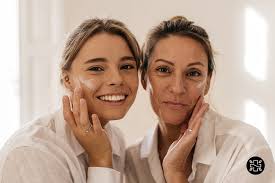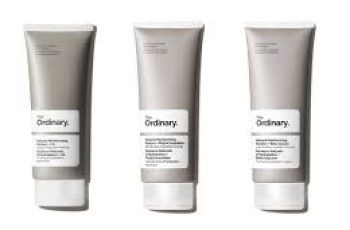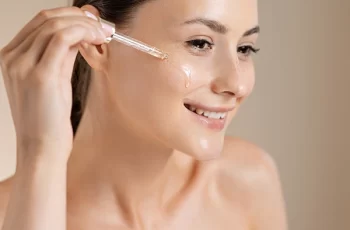
Can I use Copper Peptides and Retin A Together?
We have written about copper peptides a lot recently, these effective skin repairing ingredients are having a moment in the spotlight, so if you’re up to date you’ll have a better understanding of the benefits you can expect to see. Today we will be investigating if you can use copper peptides with Retin A, also known as retinol. We will be getting to the bottom of any worries you have about using these powerhouse skin ingredients together. So, let’s dive in and find out more.
What are peptides?
Peptides are already occurring in the skin and play an important role at building the protein of the skin. They can do this by boosting the production of collagen and elastin resulting in a firmer, smoother complexion with signs of ageing reduced. It is still uncertain how exactly peptides perform on the skin but are known for being a tolerable ingredient and are often used in conjunction with other nourishing ingredients, such as hyaluronic acid. As for more potent ingredients, you are still able to reap the rewards but requires a little more thought and consideration before application.
What is retinol?
Retinol is one of the most potent skincare ingredients and requires you to introduce it slowly into your daily routine to avoid severe dryness and irritation. The main benefit of retinol is how it can speed up the skin cell renewal revealing a fresher looking complexion. Due to the high potency of retinol, it is important to ensure you are confident using any type of product. If you are wanting to know more about retinol and how you can use it in your daily routine, check out our blog post.
Can I use peptides with Retin A?
Yes, you can, but you must apply them in a particular way to avoid negative skin reactions. Peptides are known for being an easy ingredient to combine with other ingredients, such as hyaluronic acid and niacinamide. As for teaming peptides with Retin A, or any other form of retinoid it is thought best to alternate the time of day you apply each of these ingredients. With peptides having the ability to absorb into the lower layers quickly it can often lead to the skin becoming sensitive and irritated. Therefore ideally, you should apply peptides during your morning routine following it with a retinol in your evening routine.
Do you use peptides before or after retinol?
It is best to apply peptides before retinol during your morning routine. Retinol and other forms of retinoids increase the skin’s sensitivity to UV exposure making it more susceptible to damage, such as hyperpigmentation and dark spots, this is why it is important to wear a daily SPF of 30 and above. You will also find that exposure to UV rays render retinol useless so safe application for the evening to gain the best results.
To reap the rewards of both these ingredients try applying peptide enriched serum in the morning after cleansing the skin, followed with a serum packed with a retinol that your skin has a tolerance for. This way you will gain the benefits without overworking the skin and weakening the protective barrier.
Should you use peptides with retinol?
Yes, but only if you skin is happy with you using both ingredients in the correct way. Both ingredients deliver impressive anti-ageing benefits leaving you with a youthful, glowing finish to the face. With the antioxidant properties of peptides and exfoliating ability of retinol you will also target any signs of hyperpigmentation, from sunspots, age spots and uneven skin tone. Finally, you’ll find that peptides are cell communicating ingredients and thanks to their bilingual talents they are able to tell skin cells how to act and kick start the collagen production.
When do you apply peptides?
This is very much dependant on the skincare product the active levels of peptides are formulated into. By this I mean the order you apply your skincare routine plays a vital role in ensuring each ingredient and product is able to deliver their unique benefits for the skin. You will often find peptides are formulated into mostly cream based products that are applied after cleansing and before thicker moisturisers, face oils and SPFs.
How often should you use copper peptides?
You can use copper peptides every day, twice a day. Although copper peptides deliver impressive skin results, you’ll find that their performance is enhanced when teamed with hydrating humectants such as hyaluronic acid. By using them with these you’ll find the skin barrier is left fully functioning, healthy and able to protect itself from exposure to free radical damage. If you are planning on using a peptide serum separately you will still benefit and gain a glowing, healthy complexion, but expect to wait a little longer to see any results.
When do you apply peptides?
You can apply peptides twice a day in your routine so long as you are not following them with any overly potent ingredients such as vitamin C and retinol.
What makes peptides such unique skin ingredients are how they work, what I mean by this is, once a peptide enriched product is applied onto the skin, you’ll find these peptides will act as signals in the body. How is works is if you have minor surface injury, damage to the protective barrier or signs of premature ageing the peptides will send a message to the skin to react by either healing itself or boosting collagen production. Now, this may sound as though there is a perfect understanding of how peptides work on the skin, but as I have already mentioned, there is still an air of mystery surrounding exactly how they deliver such impressive results.
I hope this blog post answers some of the questions you may have had about copper peptides and Retin A, and whether they can be used together. If you have any further concerns, it is best to consult with a doctor or dermatologist for peace of mind. Much like all skincare ingredients it’s also advisable to perform a patch test for 24 hours before applying any product on the face.
Finally, don’t forget to come and follow us over on Instagram you’ll find one of our skincare experts in the direct messages.


